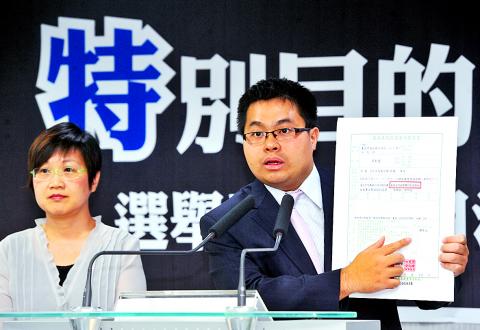The Special Investigation Division (SID) of the Supreme Prosecutors’ Office’s subpoena of Democratic Progressive Party (DPP) Secretary-General Joseph Wu (吳釗燮) could be illegal and politically motivated, the DPP said yesterday.
“Wu was listed as an ‘interested party’ in a recent subpoena from the SID... on which no details of the case were listed. The division appears to have violated the Code of Criminal Procedure (刑事訴訟法),” DPP spokesperson Huang Di-ying (黃帝穎) told a press conference.
According to the code, the SID should have listed the origin of the case and the identity of the subpoenaed — be it a witness or a defendant, Huang said, adding that “interested party” was not an identity as regulated by the code, which means that the subpoena could be illegal.

Photo: Chien Jung-fong, Taipei Times
The DPP also suspected that there is a hidden agenda behind the investigation and the subpoena because the SID “is notorious for its interference in several high-profile political cases in recent years,” the spokesperson said.
That is why the division has earned the nickname “the investigation division with special motives,” he added.
“That is also why we cannot help but wonder whether there is any political agenda behind Wu’s subpoena, as the division chose to launch an investigation into a high-ranking official of the opposition party in the run-up to the seven-in-one elections in November,” Huang said.
DPP spokesperson Hsu Chia-ching (徐佳青) said Wu would discuss the matter with the party and his lawyers before deciding whether to report to the SID.
With regards to claims of a planned purge targeting high-ranking DPP officials, Hsu said the party preferred not to speculate or over-analyze the case at the moment, but the division’s past investigations against opposition politicians and the fact that the subpoena was issued on June 26, about a month after DPP Chairperson Tsai Ing-wen (蔡英文) assumed the part post, did not give the party any reason for optimism.
“Many DPP members have been able to survive judicial oppression, but their innocence was proven only after years of court appearances and trials. We hope nothing like this will happen before the year-end elections and the presidential election in 2016,” Hsu said.
In response, the SID denied that there were any political considerations involved in the investigation, the Chinese-language Liberty Times (the Taipei Times’ sister newspaper), reported.
The SID said the ongoing case in which Wu is involved is related to a violation of the Classified National Security Information Protection Act (國家機密保護法), but that the division could not go into details.
Chinese Nationalist Party (KMT) spokesperson Charles Chen (陳以信) said the DPP had made allegations against the KMT and the judiciary without any solid evidence.
“The accusation itself is a cheap political maneuver orchestrated by the DPP,” Chen said.
The rumor that the KMT is trying to “annihilate” Tsai with the judicial investigation is a DPP smear campaign, which shows that the party wants to achieve its political goals even at the cost of losing public trust in the judicial system, the spokesperson said.

Tropical Storm Gaemi strengthened into a typhoon at 2pm yesterday, and could make landfall in Yilan County tomorrow, the Central Weather Administration (CWA) said yesterday. The agency was scheduled to issue a sea warning at 11:30pm yesterday, and could issue a land warning later today. Gaemi was moving north-northwest at 4kph, carrying maximum sustained winds near its center of up to 118.8kph and gusts of 154.8kph. The circumference is forecast to reach eastern Taiwan tomorrow morning, with the center making landfall in Yilan County later that night before departing from the north coast, CWA weather forecaster Kuan Shin-ping (官欣平) said yesterday. Uncertainty remains and

SEA WARNING LIKELY: The storm, named Gaemi, could become a moderate typhoon on Wednesday or Thursday, with the Taipei City Government preparing for flooding A tropical depression east of the Philippines developed into a tropical storm named Gaemi at 2pm yesterday, and was moving toward eastern Taiwan, the Central Weather Administration (CWA) said. Gaemi could begin to affect Taiwan proper on Tuesday, lasting until Friday, and could develop into a moderate typhoon on Wednesday or Thursday, it said. A sea warning for Gaemi could be issued as early as Tuesday morning, it added. Gaemi, the third tropical storm in the Pacific Ocean this typhoon season, is projected to begin moving northwest today, and be closest to Taiwan on Wednesday or Thursday, the agency said. Today, there would likely

DISRUPTIONS: The high-speed rail is to operate as normal, while several airlines either canceled flights or announced early departures or late arrivals Schools and offices in 15 cities and counties are to be closed today due to Typhoon Gaemi, local governments announced last night. The 15 are: Taipei, New Taipei City, Taoyuan, Tainan, Keelung, Hsinchu and Kaohsiung, as well as Yilan, Hualien, Hsinchu, Miaoli, Chiayi, Pingtung, Penghu and Lienchiang counties. People should brace for torrential rainfall brought by the storm, with its center forecast to make landfall on the east coast between tonight and tomorrow morning, the Central Weather Administration (CWA) said. The agency issued a sea warning for the typhoon at 11:30pm on Monday, followed by a land warning at 11:30am yesterday. As of

CASUALTY: A 70-year-old woman was killed by a falling tree in Kaohsiung as the premier warned all government agencies to remain on high alert for the next 24 hours Schools and offices nationwide are to be closed for a second day today as Typhoon Gaemi crosses over the nation, bringing torrential rain and whipping winds. Gaemi was forecast to make landfall late last night. From Tuesday night, its outer band brought substantial rainfall and strong winds to the nation. As of 6:15pm last night, the typhoon’s center was 20km southeast of Hualien County, Central Weather Administration (CWA) data showed. It was moving at 19kph and had a radius of 250km. As of 3pm yesterday, one woman had died, while 58 people were injured, the Central Emergency Operation Center said. The 70-year-old